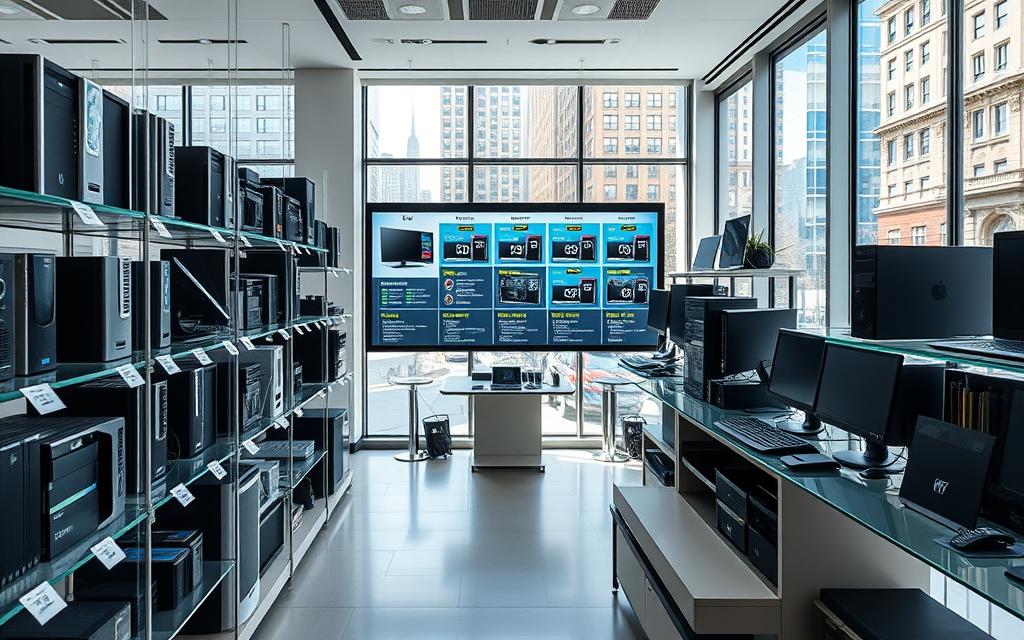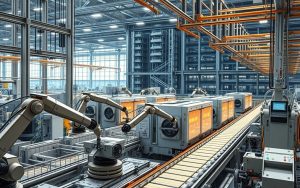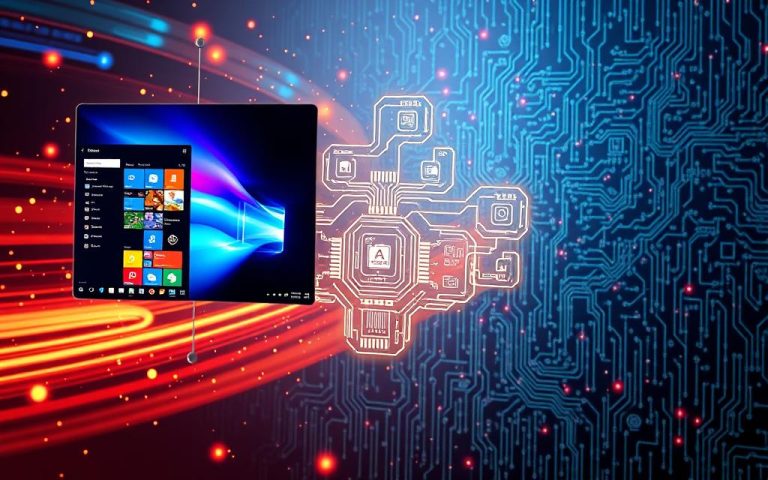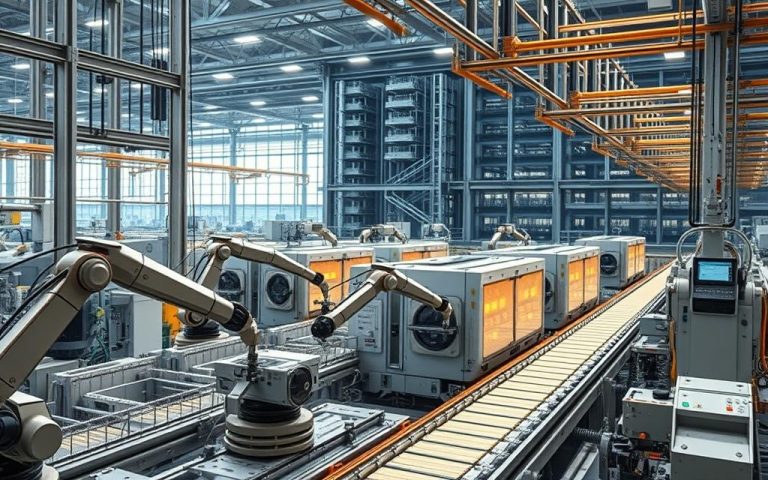Computer System Costs: What to Expect Based on Your Needs
Computer system prices in the UK vary widely. They depend on individual needs and intended use. A standard computer can cost between £200 and £4,0001.
For personal use, people typically spend £200 to £1,500 on computers. Gaming enthusiasts might invest more, with setups costing £800 to £3,2002.
Budget laptops start around £300. Mid-range systems supporting multitasking can reach £1,2002. Professionals might spend up to £2,000 for high-performance equipment1.
Key factors influencing price include processor quality and graphics capabilities. Storage type and intended usage also affect cost. Custom-built PCs can offer cost-effective solutions2.
Understanding Basic Computer System Components
Computer systems have many vital parts that work together. These components are key to creating a powerful machine. Knowing about them helps in making smart buying choices3.
Every computer has crucial hardware that defines its abilities. The system unit, or tower, is the heart of any computer setup3.
Essential Hardware Components
Key hardware components include:
- Central Processing Unit (CPU): The brain of the computer, handling calculations and instructions3
- Random Access Memory (RAM): Temporary data storage crucial for system performance4
- Storage Drives: Options include traditional Hard Disk Drives (HDD) and faster Solid State Drives (SSD)4
When choosing parts, think about what you need. A multicore processor at 2 GHz or higher works well for most tasks4.
RAM needs start at 4 GB. For heavy use, 8 GB is better4.
Software Requirements and Licensing
Software costs are a big part of computer expenses. Different systems and programs have varied prices and rules. Regular updates keep your computer safe and working well3.
Peripheral Devices and Accessories
Peripheral devices add to core computer parts:
A basic computer setup can cost between £240 and £640. The price depends on what you need and choose3.
How much does a computer system cost?
The average computer price varies widely based on your needs and desired performance. From budget-friendly to high-end systems, there’s a computer for every budget. Prices range from £300 to £3,5005.
Computer pricing falls into several categories:
- Basic Home Computers: Ideal for everyday tasks, these systems typically range from £300 to £8005.
- Mid-Range Systems: Perfect for professionals and casual users, these computers cost between £800 and £1,5005.
- High-Performance Workstations: Designed for intensive tasks, these can reach prices up to £3,5005.
The price of a computer depends on several key factors:
- Processor Type: Intel Core i3 processors are typically less expensive than i5 or i7 models6.
- Memory and Storage Capacity
- Graphics Card Performance
- Brand Reputation
Balancing performance and cost is crucial when seeking value. Gamers and creative professionals might invest £800 to £2,000 for their specific needs5.
Budget-conscious buyers can find capable machines starting from £300. Power users might spend up to £3,500 for top-tier performance.
Pro tip: Look for seasonal sales and bulk purchase options to maximise your savings on computer systems.
Professional and Business Computing Requirements
Today’s businesses face complex tech challenges requiring sophisticated computing solutions. The business computer cost landscape evolves constantly. Organisations invest strategically in workstation prices that meet their specific operational needs7.
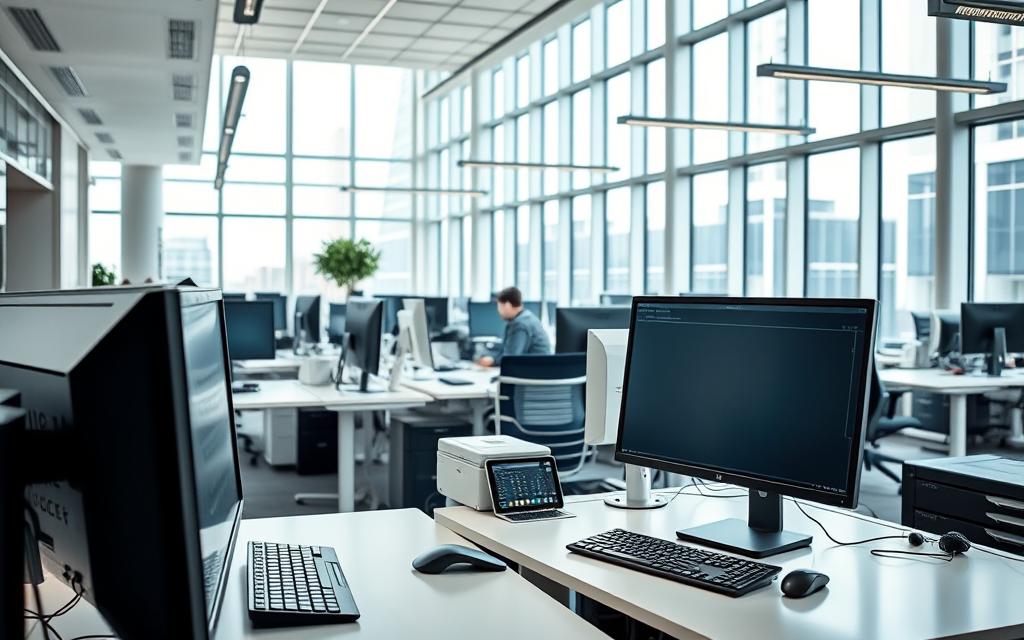
Modern enterprises need robust computing infrastructures balancing performance, reliability, and cost-effectiveness. Organisations must carefully assess their tech requirements across various professional domains.
Office Workstation Specifications
Standard office workstations need reliable hardware with balanced specs. Key factors include processor performance for multitasking and sufficient RAM for smooth operations.
Other important aspects are storage solutions with adequate capacity and network connectivity capabilities.
- Processor performance for multitasking
- Sufficient RAM for smooth operations
- Storage solutions with adequate capacity
- Network connectivity capabilities
Creative Professional Needs
Graphic designers, video editors, and multimedia specialists need high-performance systems with special features. These include powerful graphics processing units and high-resolution display support.
Creative professionals also require advanced rendering capabilities and substantial storage and memory configurations.
- Powerful graphics processing units
- High-resolution display support
- Advanced rendering capabilities
- Substantial storage and memory configurations
Enterprise-Level Solutions
Large organisations invest in comprehensive computing infrastructure supporting complex business computing requirements. These solutions often include advanced data analytics platforms and scalable tech ecosystems8.
Strategic investment in professional computing infrastructure enables businesses to enhance productivity and maintain competitive advantages.
Gaming and High-Performance Systems
Gaming PCs offer a wide range of performance and pricing options. Entry-level systems start at £500, while high-end rigs can cost up to £2,000. The price depends on the components and capabilities you desire.
Key parts greatly affect your gaming experience. Modern gaming setups typically need powerful hardware to run smoothly.
- Minimum 8GB RAM, with 16-32GB recommended for optimal performance9
- High-performance graphics cards like NVIDIA GeForce RTX or AMD Radeon RX9
- Fast storage solutions such as NVMe SSDs for quicker game loading9
Budget-friendly gamers can find great value in £1,000 systems. These offer solid 1080p and emerging 1440p gaming capabilities.
For ultimate performance, top-tier systems can cost up to £3,500. These feature cutting-edge components like the Alienware Aurora R16 or Corsair One i50010.
Check out some high-performance gaming desktops to compare options and features.
The right gaming PC is an investment in immersive digital experiences.
Cooling solutions are crucial for gaming PCs. Air cooling is standard, but liquid cooling offers better thermal management.
Financing options start at £15 per month. This makes building your dream gaming setup more accessible than ever9.
Energy Consumption and Operating Costs
PC power consumption is key to managing computer running costs. Modern systems have varying energy needs. A high-end CPU might add £16 to monthly energy bills11.
Laptops typically use 30 to 70 watts. Gaming systems can draw 200 to 500 watts11. Average computer electricity use ranges from 9.1 kWh to 15.2 kWh monthly.
This translates to a yearly cost of about £20.7211. Monthly costs vary based on system specs and usage patterns.
Reducing PC power use involves smart choices. Energy-efficient settings and sleep modes can lower costs. Choosing lower wattage components also helps decrease expenses.
Modern, energy-efficient hardware cuts electricity bills and environmental impact. Strategic power management could save £30 to £50 yearly12.
FAQ
What factors influence the cost of a computer system?
Several key factors affect a computer’s cost. These include its intended use, component quality, and brand reputation. Hardware specs like CPU, RAM, storage, and graphics card also play a role.
Software requirements and peripheral devices further influence the overall price. The system’s purpose, whether for basic tasks or professional work, is crucial in determining costs.
How much does a basic home computer cost in the UK?
Basic home computers in the UK typically cost between £300 and £600. These systems offer good performance for everyday tasks like web browsing and document editing.
They often include integrated graphics and mid-range processors. Such setups are suitable for most home computing needs without breaking the bank.
What are the typical costs for a professional-grade workstation?
Professional workstations can range from £800 to £3,000. The price depends on specific job requirements and performance needs.
Creative professionals often need high-performance CPUs and dedicated graphics cards. Substantial RAM is also crucial for handling resource-intensive applications in fields like graphic design or video editing.
How much should I budget for a gaming computer?
Gaming computers have a wide price range. Entry-level systems start at £600-£1,000, while high-end rigs can cost £2,000-£5,000.
GPU quality and processor speed greatly affect the price. Advanced cooling systems also contribute to the overall cost of a gaming setup.
What ongoing costs should I consider when buying a computer?
Beyond the initial purchase, factor in energy consumption and potential software subscriptions. Maintenance costs should also be considered.
Modern computers typically use 60-250 watts. This can result in £10-£50 monthly electricity costs, depending on usage and system specs.
Are pre-built systems more cost-effective than custom-built computers?
Pre-built systems offer convenience and warranty protection. They usually cost 10-20% more than equivalent custom-built setups.
Custom builds allow more flexibility in choosing components. They can save money but require technical know-how and assembly skills.
How often should I expect to upgrade my computer system?
Well-maintained computer systems typically remain functional for 3-5 years. Professionals and gamers might need more frequent upgrades, usually every 2-3 years.
Regular upgrades help keep pace with evolving software and hardware requirements. This ensures optimal performance for demanding tasks and applications.
What components should I prioritise for the best value?
Focus on investing in the processor (CPU), graphics card (GPU), and RAM. These components have the most direct impact on system performance.
A balanced approach ensures reliable performance without overspending. Prioritising these key parts helps achieve the best value for your budget.
How can I reduce computer system costs?
Buy during sales periods to get better deals. Consider previous-generation components, which often offer good performance at lower prices.
Choose modular systems that allow gradual upgrades. Look for multi-purpose components that can serve various computing needs effectively.
What additional costs should I budget for beyond the computer system?
Budget for essential peripherals like monitors (£100-£500) and keyboards and mice (£30-£150). Don’t forget external storage (£50-£200).
Consider potential software licenses for productivity suites and antivirus protection. Specialised applications may also require additional budget allocation.
Source Links
- https://www.superprof.co.uk/blog/cost-of-computers/
- https://callnerds.com/computer-cost-guide-buying-new-pc/?srsltid=AfmBOoqCc3gdJRBzjclkAAZ3vBubKK-Cu73YRjDRVq_yvbGh1cO8TJxF
- https://www.universalclass.com/articles/computers/understanding-computer-components-and-accessories.htm
- https://www.nibusinessinfo.co.uk/content/computer-hardware-components-and-specifications
- https://www.business.org/finance/cost-management/much-computer-cost/
- https://www.tpointtech.com/how-much-does-a-computer-cost
- https://courses.uwe.ac.uk/N1I1/business-computing
- https://www.northumbria.ac.uk/study-at-northumbria/courses/bsc-hons-business-computing-uusbcp1/
- https://www.cyberpowersystem.co.uk/category/gaming-pcs/?srsltid=AfmBOor_CGHSBHfV4gSY3PANSVlZeqEp2X9rXLSdKo3_YhmT5n8RLuV4
- https://www.techradar.com/news/the-best-gaming-pc
- https://www.energysage.com/electricity/house-watts/how-many-watts-does-a-computer-use/
- https://www.pcmag.com/how-to/power-hungry-pc-how-much-electricity-computer-consumes

